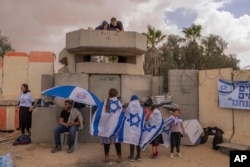Several U.N. humanitarian officials warned on Tuesday that conflict-fueled famine was likely in the Gaza Strip if the fighting was not stopped soon.
“If no action is taken, we fear widespread famine in Gaza is almost inevitable, a conflict that has claimed nearly 30,000 lives and injured 70,000 since October, according to Gaza’s health ministry , and there will be more injured victims,” said Ramesh Rajasingham, director of the coordination unit of the United Nations Humanitarian Office.
He spoke at a UN Security Council meeting called for by member states Algeria, Guyana, Slovenia and Switzerland amid growing concerns that hunger is being used as a weapon of war.
Rajasingham said that at least 576,000 people in Gaza, accounting for 25% of the total population, are one step away from famine, and almost all residents rely on inadequate humanitarian food aid to survive.
“Unfortunately, as dire as we are seeing today, the situation is likely to get worse,” he said.
“Child malnutrition in Gaza is among the worst in the world,” said Karl Skow, deputy executive director of the World Food Program. “One in six children under the age of 2 is severely malnourished.”
collapse of agricultural production
Maurizio Martina, assistant director-general of the United Nations Food and Agriculture Organization, explains how the entire food supply chain is affected by the war. Israel forces farmers to evacuate their land or flee shelling that destroys crops; cattle and poultry starve to death or are killed in explosions; fishing is banned; and groundwater is contaminated.
“The most likely scenario is that agricultural production in the north will collapse by May 2024,” Martina said. “We’ve seen this collapse.”
In a white-note memo sent to the Security Council ahead of the meeting, U.N. humanitarian chief Martin Griffiths reported on the risk of famine caused by the conflict, following a Council resolution on the subject five years ago.
“Immediate action is needed to prevent conflict-induced famine and widespread food insecurity in Gaza,” he wrote. He called for a ceasefire and urged the Security Council to use its influence to take action to facilitate the flow of aid into Gaza and within Gaza, and to resume the flow of goods. The territory, protection and restoration of critical infrastructure and other recommendations.
Aid flows are “unpredictable” and “inadequate”
Griffiths said humanitarian workers continued to face “significant obstacles” in delivering the response needed to avert famine.
Griffiths wrote: “These include border crossing closures, severe movement restrictions, denial of passage, cumbersome vetting procedures, security risks, incidents caused by desperate civilians, breakdowns in law and order and restrictions on communications and protective equipment. “Logistical infrastructure in and outside Gaza is inadequate, and the flow of aid remains unpredictable and inadequate.”
Israel denies it is impeding or limiting aid to Gaza.
“Israel is doing everything it can to care for civilians, going above and beyond what is expected, let alone required,” Jonathan Miller, Israel’s deputy UN envoy, told the Security Council. “Israel is committed to improving the humanitarian situation in Gaza and continues to work to secure support from many countries and the United Nations Agency humanitarian assistance comes in.”
Miller said that since the outbreak of the war, Israel has helped deliver 254,000 tons of relief supplies to Gaza, including 165,000 tons of food. He accused Hamas of diverting aid and accused the United Nations of failing to manage and distribute it effectively.
“Limits on the amount and speed of aid depend on the ability of the United Nations and other agencies to effectively receive, store and distribute aid,” Miller said.
Famine in northern Gaza ‘imminent’
The situation is most serious in northern Gaza, which remains blockaded by Israeli forces.
Around 300,000 people are believed to have defied earlier Israeli orders to evacuate and remained amid months of fierce fighting between the IDF and Hamas.
“If nothing changes, there is going to be famine in northern Gaza,” said the WFP’s Skow. “We all have to live up to our responsibilities and make sure this doesn’t happen on our watch.”
UNRWA, the U.N. agency responsible for aiding the Palestinians and delivering most relief supplies, said the last time it received food aid to northern Gaza was on January 23. On February 20, the World Food Program suspended food deliveries to northern Gaza. North because of the lack of security for both aid workers and recipients. The last time the World Health Organization arrived with medical supplies at Gaza City’s largest hospital, Al Shifa, was on January 22.
A week ago, the 15-nation Security Council failed to pass a resolution calling for an immediate humanitarian ceasefire due to a U.S. veto. Some Security Council members reiterated calls for a ceasefire at Tuesday’s meeting.
“Only a ceasefire that must be respected by all parties to the conflict can guarantee uninterrupted delivery of humanitarian assistance and ensure adequate and timely assistance,” said Slovenian Ambassador Samuel Žebogar.
Guyana, who chairs the committee this month, said “silence is not an acceptable response” when it comes to conflict and growing food insecurity.
“The Security Council must intervene to stop flagrant violations of international law by United Nations member states,” Ambassador Caroline Rodriguez-Burkett said.
Even Israel’s closest ally, the United States, has expressed growing frustration with the slow delivery of aid, urging Israel to keep border crossings open and open new ones.
“Simply put, Israel must do more,” Ambassador Robert Wood said.
Russia, which rarely supports sanctions, suggested the Security Council consider imposing sanctions for impeding humanitarian aid.
Israel began a military operation to eliminate Hamas after Hamas militants entered southern Israel on October 7 and killed 1,200 people, according to Israeli officials. About 250 other people were taken hostage.
Hamas, designated a terrorist organization by the United States, Britain and the European Union, still holds about 130 hostages in Gaza, 30 of whom are believed to be dead.
Follow us on Google news ,Twitter , and Join Whatsapp Group of thelocalreport.in

















